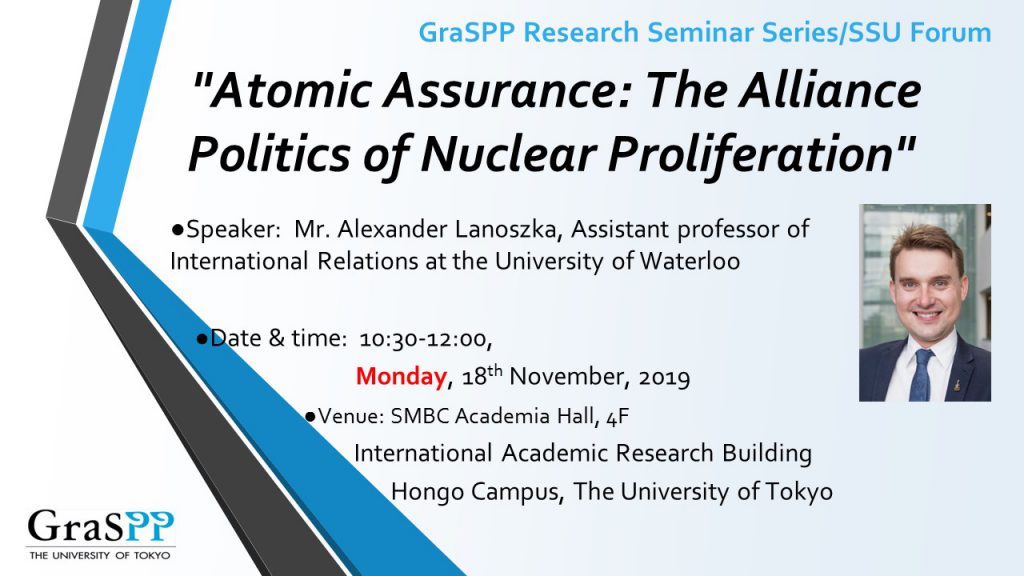The Graduate School of Public Policy (GraSPP), The University of Tokyo, is pleased to invite you to the upcoming GraSPP Research Seminar that will be held on October 16, 2019. This seminar is jointly organized with the Security Studies Unit (SSU) Forum.
Title: “Atomic Assurance: The Alliance Politics of Nuclear Proliferation”
Speaker:
Mr. Alexander Lanoszka, Assistant professor of International Relations at the University of Waterloo
Moderator: Kiichi FUJIWARA, Professor, Graduate Schools of Law and Politics, The University of Tokyo
Date: November 18, 2019
Time: 10:30−12:00
Venue: SMBC Academia Hall, 4F, International Academic Research Building, The University of Tokyo
(map:https://www.pp.u-tokyo.ac.jp/en/campus-map/ )
Registration: Needed. Please register from the link below.
https://ifi.u-tokyo.ac.jp/event_form/4847/
Co-hosted by: Security Studies Unit, Institute for Future Initiatives, The University of Tokyo
Language: English
Abstract:
Do alliances curb efforts by states to develop nuclear weapons? Atomic Assurance looks at what makes alliances sufficiently credible to prevent nuclear proliferation; how alliances can break down and so encourage nuclear proliferation; and whether security guarantors like the United States can use alliance ties to end the nuclear efforts of their allies.
Alexander Lanoszka finds that military alliances are less useful in preventing allies from acquiring nuclear weapons than conventional wisdom suggests. Through intensive case studies of West Germany, Japan, and South Korea, as well as a series of smaller cases on Great Britain, France, Norway, Australia, and Taiwan, Atomic Assurance shows that it is easier to prevent an ally from initiating a nuclear program than to stop an ally that has already started one; in-theater conventional forces are crucial in making American nuclear guarantees credible; the American coercion of allies who started, or were tempted to start, a nuclear weapons program has played less of a role in forestalling nuclear proliferation than analysts have assumed; and the economic or technological reliance of a security-dependent ally on the United States works better to reverse or to halt that ally’s nuclear bid than anything else.
Speaker’s biography:
Mr. Alexander Lanoszka is an assistant professor of International Relations at the University of Waterloo. His research agenda encompasses international security, alliance politics, and theories of war, with special focus on Central and Northeastern Europe. He is an Honorary Fellow at City, University of London, where he previously taught prior to coming to Waterloo. He held fellowships at the Massachusetts Institute of Technology and Dartmouth College upon finishing his PhD at Princeton University. He has published Atomic Assurance: The Alliance Politics of Nuclear Proliferation (Cornell University Press, 2018) as well as articles in journals such as International Security, International Affairs, Security Studies, and Journal of Strategic Studies.
Related Link:
Graduate School of Public Policy, The University of Tokyo (https://www.pp.u-tokyo.ac.jp/en/)


